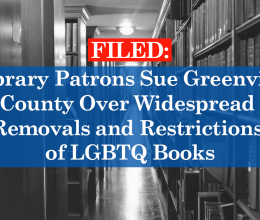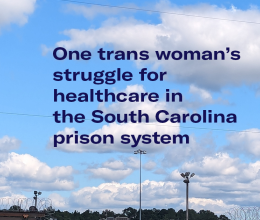
Sofia Cano is a transgender woman who has been denied hormone therapy and other reasonable accommodations while in the custody of the South Carolina Department of Corrections (SCDC). Corrections officials interpreted a proviso in the state budget to forbid the provision of gender-affirming medical care to most transgender incarcerated people, even when doctors say such care is medically necessary. The ACLU of South Carolina, Brooklyn Law School LGBTQ Advocacy Clinic, and Baker Botts L.L.P. filed a federal lawsuit in November 2022 against the SCDC and prison officials on behalf of Ms. Cano.
Ms. Cano suffers from gender dysphoria, a medical condition that causes severe distress arising from misalignment between an individual’s gender identity and their sex assigned at birth. Medical experts, including the World Professional Association for Transgender Health (WPATH), agree that gender-affirming medical care, including hormone therapy, can be medically necessary to treat gender dysphoria.
Despite all indications that hormone therapy is medically necessary in her case, SCDC has argued it can provide hormones only to those inmates who were on a hormone regimen when they entered custody, a condition which Ms. Cano does not satisfy. Ms. Cano has been imprisoned since she was 13 years old and did not obtain a gender dysphoria diagnosis or medical treatment before her incarceration.
For inmates such as Ms. Cano who were unable to obtain treatment before entering custody, the enforcement of SCDC’s policy categorically denies medically necessary care. All Ms. Cano wants is to be treated fairly and get the medical care she needs. SCDC’s own providers have diagnosed her with gender dysphoria, and it is traumatizing and isolating for her to be denied healthcare services to treat it.
Why this case?
The ACLU of South Carolina is committed to defending the civil liberties of LGBTQ people anywhere in South Carolina, including our prison system.
This is a matter of constitutional rights. Denying Ms. Cano medical care represents a violation of the Eighth Amendment’s prohibition on cruel and unusual punishment, which requires prison systems to treat inmates’ serious medical needs. Since Ms. Cano is being denied medical care because she is transgender, SCDC’s actions also violate the Equal Protection Clause of the Fourteenth Amendment. In addition to constitutional claims, Ms. Cano raises statutory claims under the Americans with Disability Act, Section 504 of the Rehabilitation Act, and Section 1557 of the Affordable Care Act.
The latest
The case is ongoing. On January 30, 2024, U.S. District Judge Donald C. Coggins, Jr. issued a preliminary injunction stating that Ms. Cano is likely to prevail in her lawsuit and that SCDC must provide her with healthcare while the case is ongoing.
In the preliminary injunction, Judge Coggins ordered:
“Defendants are directed to provide Plaintiff with medically necessary gender-affirming care for her gender dysphoria. They are directed to have Plaintiff evaluated by SCDC medical professionals within 30 days of today’s date to determine whether hormone therapy is medically necessary to treat Plaintiff’s gender dysphoria.”
SCDC’s chosen doctor interviewed Ms. Cano and, contrary to expert analysis of Sofia’s case, reported that she does not need hormone therapy.
In a response brief on May 29, 2024, our legal team argued:
"Defendants do not contest that they knew Ms. Cano suffered from gender dysphoria, that gender dysphoria is a serious medical condition, or that they refused to provide necessary medical care (here, hormone replacement therapy) for nonmedical reasons. Whether their decision was motivated by base transphobia or sincere fidelity to state law, it was deliberately indifferent all the same."
On October 30, 2024, our legal team filed a Motion for Summary Judgment.







